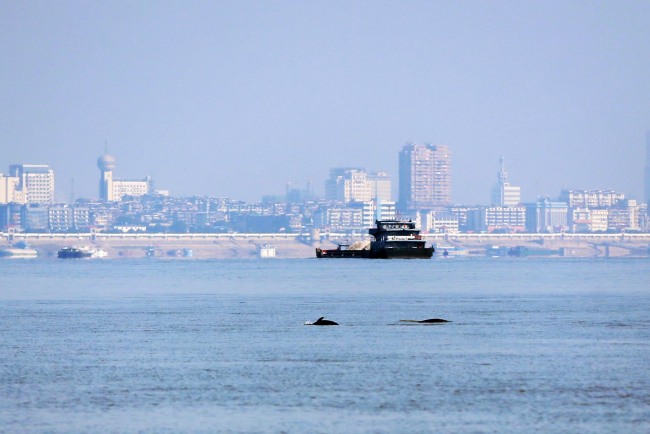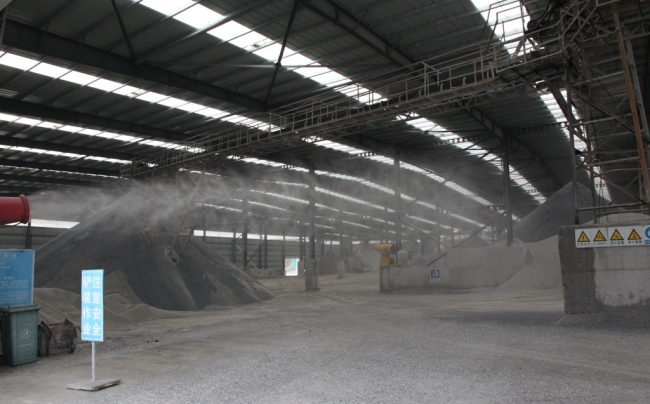
From the People's Daily app.
And this is Story in the Story.
Anqing is an industrial city along the lower reaches of the Yangtze River, China's longest natural waterway.
Many of its five million, 300-thousand residents work at or live close to the factories that are a backbone of the economy of a developing city.
Between 2010 and 2017, the villagers' tranquil nightlife was disturbed by the noise of the mining company, Changyin Mining Group, which operated day and night.
But due to China's focus now on stepping up environmental protection and ecological rehabilitation in the Yangtze River region, a change has come about and the company's machines and trucks don't operate at night.
The company's environmental overhaul came as the city government of Anqing initiated a massive city-wide environmental protection drive in 2017.
Today's Story in the Story looks at steps that have been taken by mining companies to ensure environmental standards are being implemented.

Regions along the Yangtze River are stepping up environmental protection and ecological rehabilitation. (Photo: China Plus)
Zhang Zhipeng is chief manager of the Changyin Mining Group, which mainly produces cement limestone and construction stone.
Zhang says his company witnessed a turning point in 2017, when it suspended operations for a comprehensive environmental overhaul that took seven months to complete.
"We felt that what we had done was not up to national environmental standards. For example, we used to process the stone in the open air. We had to take it inside and that cost 30 million yuan. Overall, we spent up to 50 million yuan on projects to prevent or treat air, water and industrial waste pollution."
As part of the environmental overhaul, a huge 17,000-square-meter steel-structured factory was put up to bring the stone processing indoors.
Water spray equipment was also installed to deal with the dust created during the processing of raw stone. Meanwhile, the company has built a special road for its own use to avoid accidents on local village roads.
Also, a sewage system has been built to treat and recycle the water flowing out of the mining and processing sites.
With regard to noise pollution, the company says it follows strict rules that require all mining, processing and transport work to be suspended from 10pm to 6am the next day.
Zhang admits this measure has cost them a lot, but he says it's a must to consider the well-being of the some 6,500 villagers living nearby.
"Of course, it comes with a big price. But we shouldn't disturb nearby villagers' sleep. We should also keep in mind road security at night. This is the economic cost we have to take on."
Most importantly, Zhang says the disused mining sites are being rehabilitated and planted with trees.
Meanwhile, to cultivate a harmonious relationship with local villagers, the mining company has contributed to upgrading the local infrastructure and villagers' welfare benefits. For example, street lighting has now been installed.

The water spray equipment in one of Changyin’s factories is working to contain the dust created during the processing of raw stone. (Photo: China Plus)
Liu Yingen, a villager, describes other benefits he and his fellow villagers have received from the company.
"The stone used in the dam of one of the ponds in our village were donated by the company. It also paid for the rails on the dam. Not only that, the company gives each of our adult villagers a 200 yuan healthcare subsidy every year. This kind of support is a real, tangible benefit for us."
According to the mining company, each year two million yuan is earmarked for subsidizing the villagers' healthcare and other social welfare programs.
It's estimated that the company has brought a total of about 30 million yuan in economic benefits to the local villagers.
The Shuguang chemical company is a major enterprise in Anqing, making fertilizers and other chemical products.
One of its factories operated just beside the Yangtze River, not far from concentrated residential areas. With the upgrading of national environmental standards, the factory's pollution prevention and treatment facilities needed to be updated or replaced.
Its new factories have been re-homed in a purpose-built chemical industrial zone, some six kilometers from the nearest point of the Yangtze River.
Cao Jianming, a manager at the chemical company, says the relocation project has not been easy.
"We encountered a lot of difficulties during the relocation process. Because the environmental standards had been raised, the original equipment that we had always used in the factory also had to be replaced. It meant destroying the old factory and building a new one from scratch."
As well as planting trees in the wharf areas, tree-planting work is being stepped up in other areas along the banks of the Yangtze River. This kind of tree-planting effort in Anqing is being repeated in other regions along the 6,300-kilometer Yangtze River.
(Produced by Nancy Yan Xu, Brian Lowe, Lance Crayon and Chelle Wenqian Zeng. Music by: bensound.com. Text from China Plus.)


